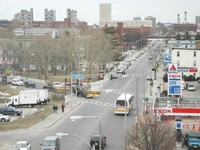Mellone says the framework should be approved first if Harvard wants its institutional master plan to be supported by the community.
“If Harvard wants to respect the community, whatever they propose has to conform with the guidelines,” he says. “That’s what that purpose is. That has to be finalized.”
But even as the official presentation of the neighborhood plan is held up, residents have expressed optimism that the relationship between Harvard and Allston is improving.
“Up until now there has been an anxiety as to what Harvard is going to do,” Berkeley says. “[People] were concerned that Harvard was purchasing so much land that they would go against residential property, and so far Harvard hasn’t really done that, with a few exceptions.”
And at least one common resident complaint—that Harvard has not presented enough specific information about its expansion plans—might be solved when the new master plan is released.
Spiegelman says the plan “may not specifically show you the design of buildings,” but might outline the dimensions and location of buildings.
McHale says that he thinks there is a “healthy tension” between the community and the University.
“[There’s] a historic skepticism and a genuine kind of anticipation,” he says. “I think it holds new promise.”
—Staff writer Joseph M. Tartakoff can be reached at tartakof@fas.harvard.edu.









